I often get asked… should I rent an RV?
Let me start off by saying that there’s no one-size-fits-all solution for every traveller. A lot of it depends on personal preference, travel style and budget. But when it comes to road trips, my favourite method for getting around is RV rentals.
You get all the benefits of owning, without the long-term commitment and maintenance, and you can rent in almost every corner of the world.
But how do RV rentals stack up against tent camping and roadside hotels? I’ve compared the costs, pros and cons, and will let you decide the best fit.
Let’s hit the road!
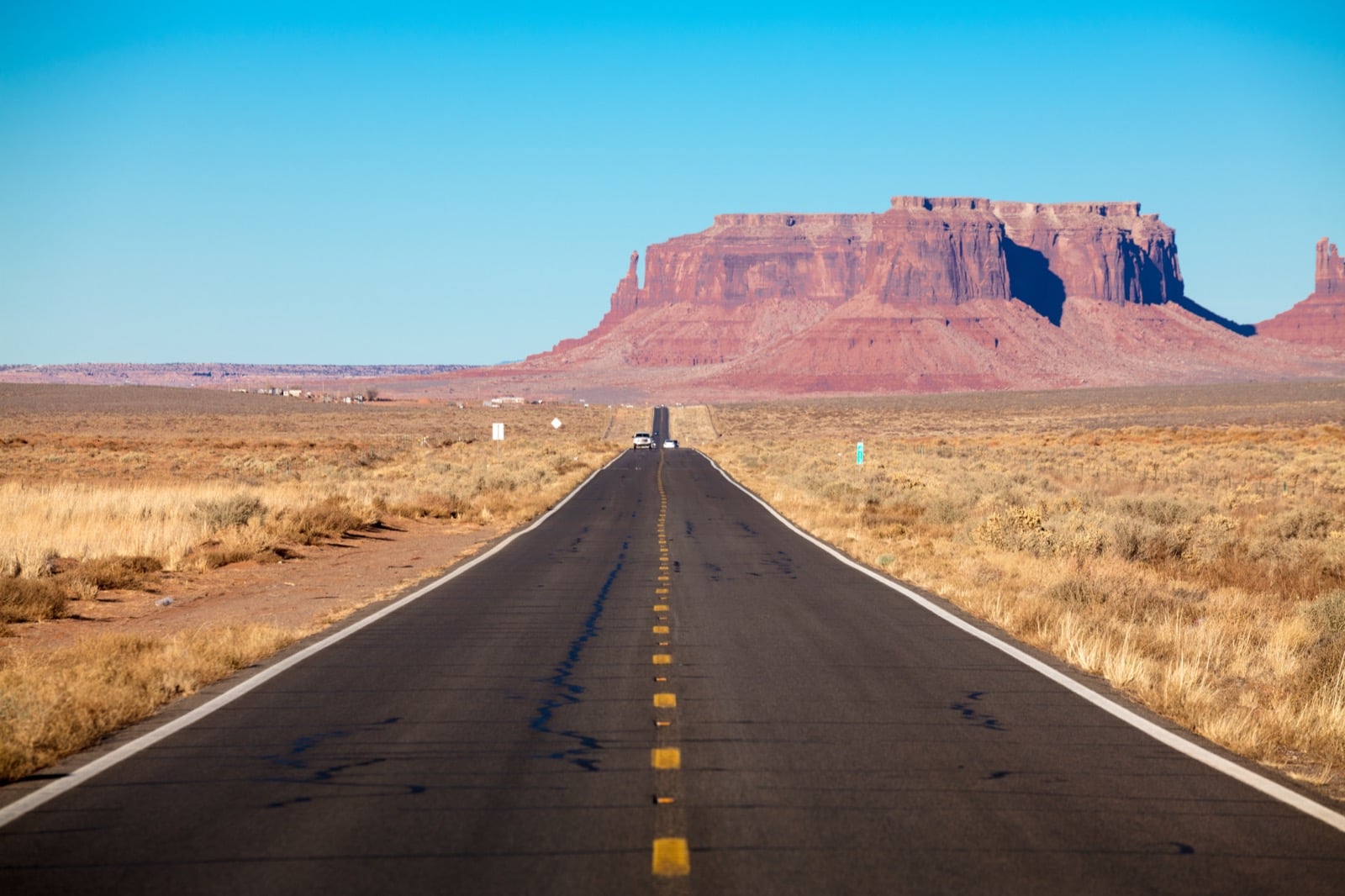
Road Trip Cost Factors
No two road trips are the same. The cost-effectiveness will depend on a few factors:
1. Number of travellers
Typical hotel rooms only fit 2 adults, whereas large rooms might be able to squeeze 4 people. However, large RV motorhomes can comfortably fit 5 or more.
2. Where you’re driving
Some areas have more hotel options than others. If you’re heading into national parks or remote backcountry, then hotel options will be slim-to-none. Whereas RVs give you more flexibility. Consider if you’re driving from your usual home base with your own car, or flying to your destination to undertake the road trip.
3. Distance
The further you go, the higher the fuel costs. The fuel efficiency of a small car compared to a deluxe motorhome will be magnified by the greater distance travelled.
4. Travel style
Do you prefer fine dining or cooking at home? Making your own meals in an RV is an easy way to save on food costs. Do you prefer the perks of a luxury hotel swimming pool, or lean towards a simpler immersion in nature with more quality time for loved ones?

Comparing RV Rental vs Tent Camping vs Hotels
Now I’ll break down the most important factors comparing these road trip options. We’ll base these numbers on a 7-night 3,500-mile trip in the US for 4 people, and a fuel price of US$3.40/gallon.
RV Rental
Typical costs:
Vehicle: This can vary depending on the type of RV (I’ve gone into more detail about that later). RV rental prices start at $50/night and range to $450/night depending on style, size and vehicle age. There are plenty of options at US$100/night, so I’ll base the cost on that.
Campground: Prices can vary greatly – from US$80/night in a private resort-style property in a high-demand location, down to $50 for 2 weeks in a public campground. It’s even cheaper camping off-grid (called “boondocking”), and Walmart famously allows free overnight RV parking. There are plenty of full-featured campgrounds in the US$40/night range, so I’ll base the cost on that.
Fuel: Assuming 13 MPG for a smaller Class C motorhome or fifth wheel (the most popular types to rent), that’s $915 for the whole trip.
Meals: $200 per week for groceries is realistic (US$28.60/day).
Total: $2,095
Pros:
- Complete freedom to drive wherever you want, and a lot of location flexibility for overnight stays.
- More comfortable and more secure than tenting.
- No need to pack and unpack every day, unlike hotels.
Cons:
- Higher fuel costs compared to tent camping and hotels.
- Larger RVs may not be suitable for off-road and backcountry adventures.
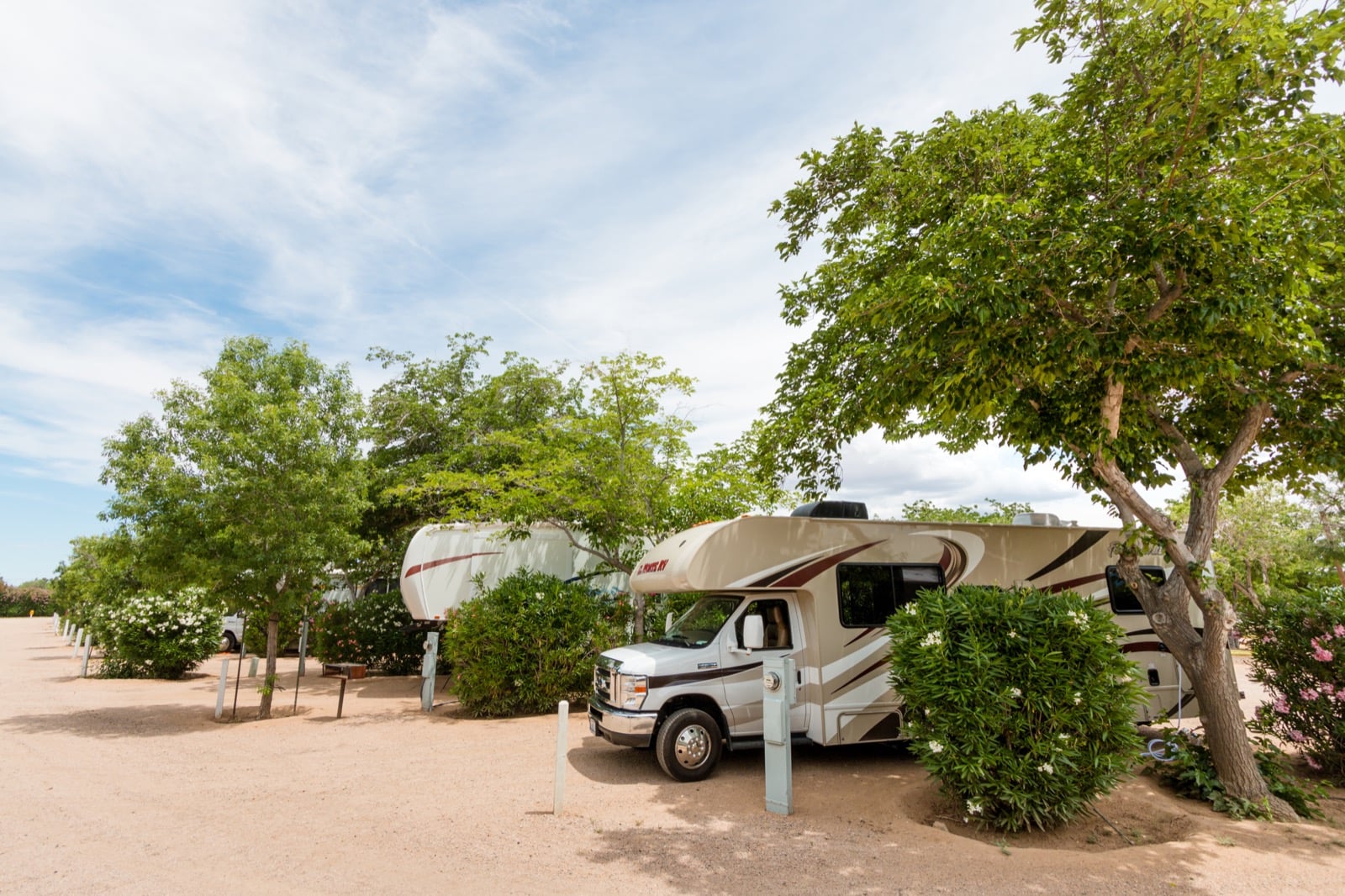

Tent Camping
Typical costs:
Vehicle: if you use your own, it’s almost “free” (except for depreciation, maintenance costs, and vehicle registration). If you rent a car, the price can vary greatly by location and season. The US average 7-day car rental is US$84.14/day, or US$589 for a week.
Campground: Prices range between $12 - $45/night, depending on location and season. $30/night covers a lot of options.
Tent: If you don’t own a camping tent, these can be rented online for around $40 per week.
Fuel: Assuming 30 MPG for a typical mid-range car, that’s $396 for the whole trip.
Meals: Cooking over a campfire or butane heater will save a few dollars, but you’ll most likely end up eating at roadside restaurants which average US$125/day.
Total: $2,110
Pros:
- Lightweight tents can be set up in as little as 10 minutes.
- A great option for accessing hard-to-reach destinations.
Cons:
- Little protection from the cold or heat.
- Minimal security, and protection from wild animals or thieves.
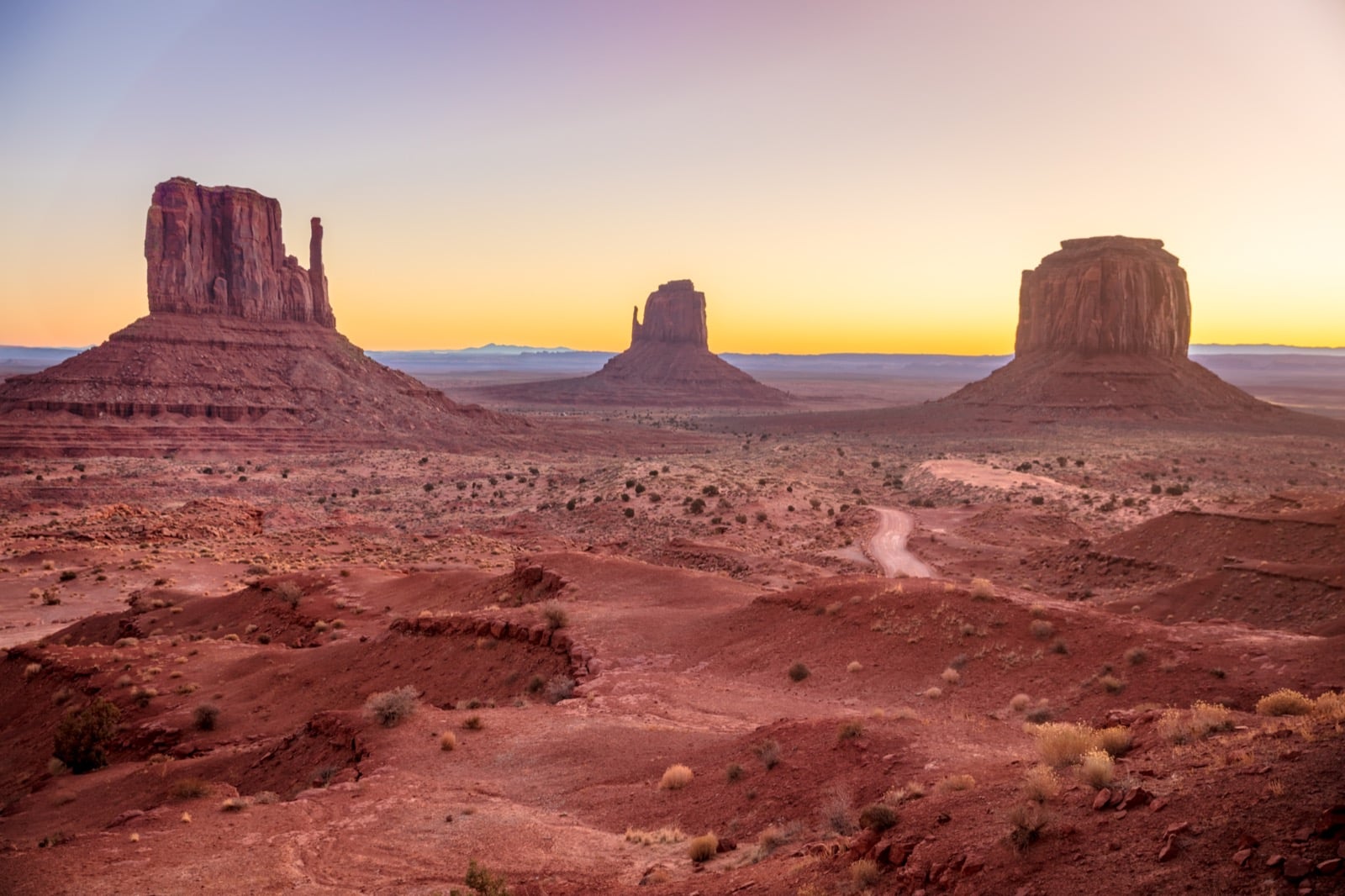
Roadside Hotels
Typical costs:
Vehicle: As with tent camping, if you use your own vehicle, it will save money, otherwise, US$589 for a week.
Hotel: The average hotel price in the US in 2019 was US$131/night. Naturally, prices will fluctuate depending on the season, demand and location. Squeezing 4 adults into 1 room will be a tight fit, and likely require a more expensive room or two regular rooms.
Fuel: Assuming 30 MPG for a typical mid-range car, that’s $396 for the whole trip.
Meals: As with tent camping, roadside restaurants will average US$125/day.
Total: $2,777
Pros:
- Easy to book.
- Less “work” to do compared to RV and camping.
Cons:
- Can be more expensive than the other 2 options, especially in peak season.
- Quality of accommodation tends to be fairly basic – especially with budget-friendly hotels.
- Less freedom in staying where you want.
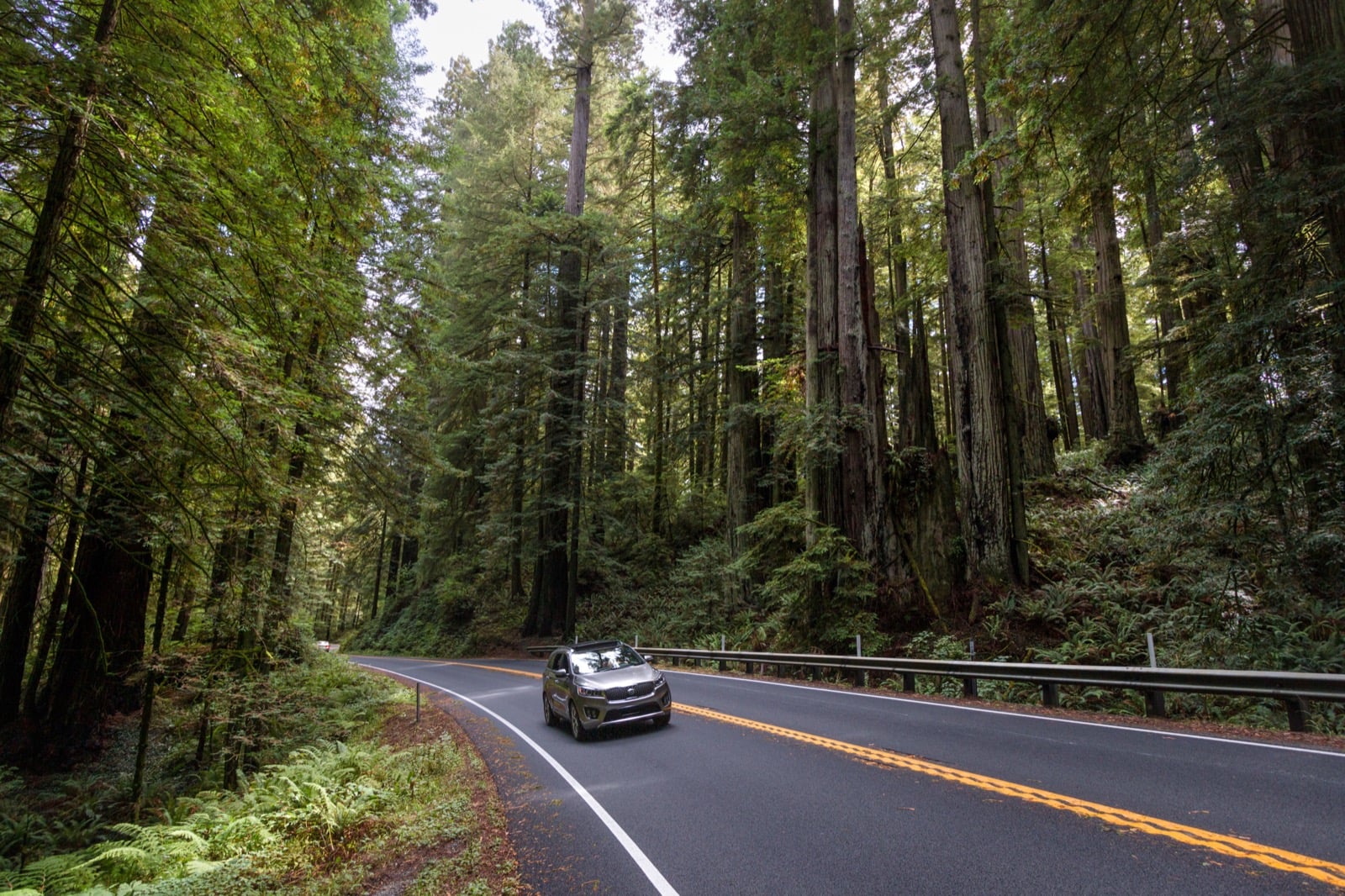
Different Types of RVs
So now you like the idea of driving an RV, but which type should you choose? The first two types you tow with a pick-up truck or SUV, and the second two you drive:

Travel Trailer – comes in many sizes, is most fuel-efficient, and can be towed with a pick-up truck or large SUV.

Fifth Wheel – features an overbed hitch, has up to 5 slide outs, and can be towed with a full-sized pick-up truck.

Class C Motorhome – indulgent amenities, varies in size up to 38 feet, and can include overhead sleeping space.

Class A Motorhome – most high-end and luxurious, often has secondary sleeping spaces, full-size amenities, feels like driving a bus, and is the least fuel efficient.
I’ve driven a Class C, and it’s pretty comfortable and surprisingly not too intimidating for a first-time RVer. Within a matter of minutes behind the wheel, it felt very familiar.
The advantage of towable RVs is that you can park them at a campsite and explore the surrounding area in the most fuel-economical way. This is also better for accessing unpaved roads and hard-to-reach locations.
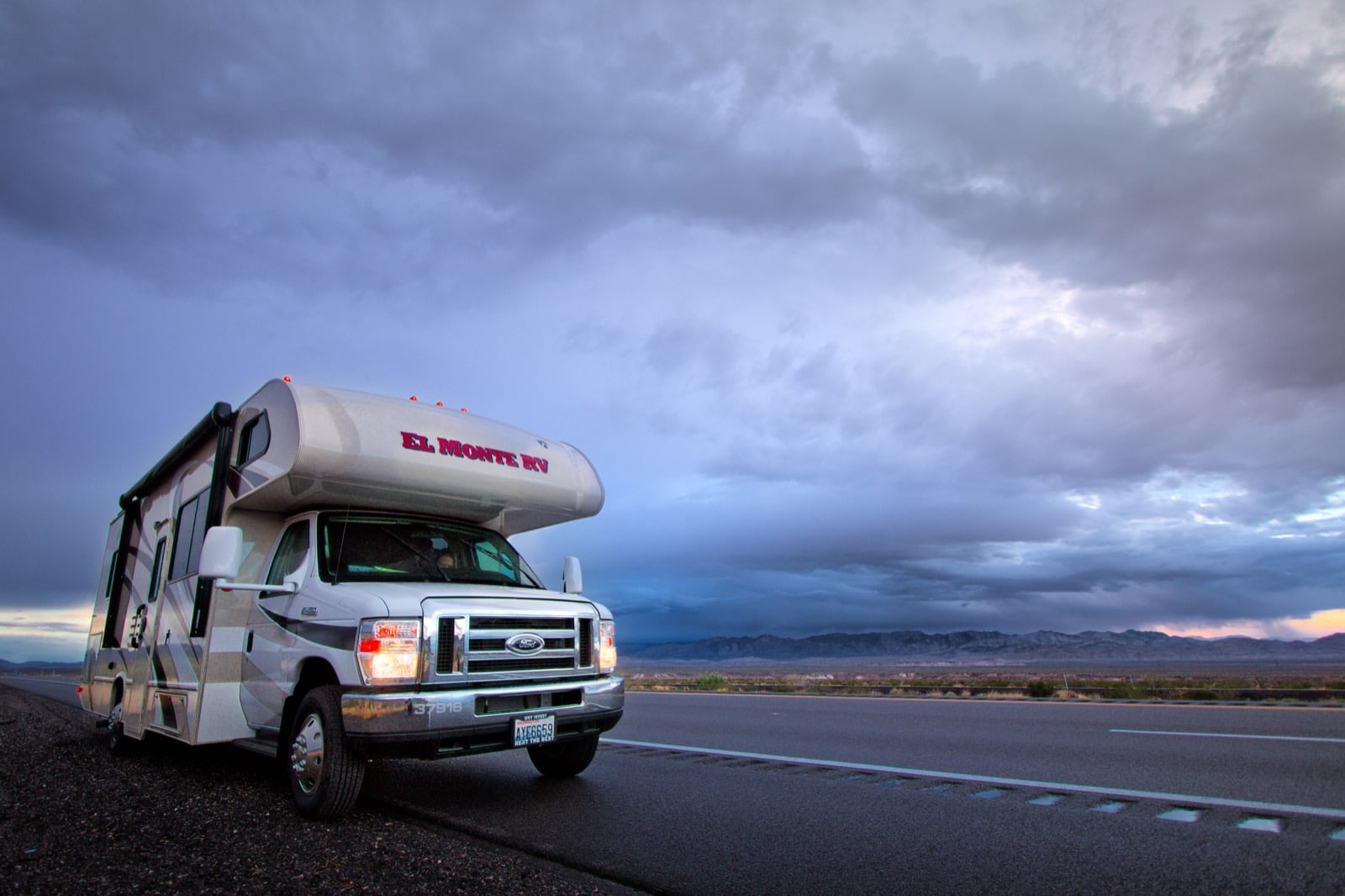
Where to Rent an RV
If your friend or family member owns an RV, it might be possible to rent from them. But most likely, you’ll choose between large companies like Cruise America, which tend to charge many add-on fees (such as mileage, generator rental, and linens), or a peer-to-peer platform like RVshare, which is more economical. RVshare has the biggest community of RV owners and renters, so there are always plenty of options to choose from. RVshare has been around since 2012 and has received thousands of positive reviews from happy customers, so they’re doing something right.

How Does RVshare Work?
Because you’re dealing with individually-owned RVs, every experience is different. You can filter a list of available options on RVshare by location, desired amenities (such as shower or refrigerator), cancellation type (flexible, standard or strict), and even pet-friendly vehicles.
RVshare also has a few unique rental options, including:
Instant book: You guessed it…this lets you book instantly without waiting for the owner to respond. The availability calendar shows exactly what days are open.
Stationary rental: If you don’t feel comfortable driving or towing a big vehicle,this lets you experience an RV without any worries or even having to decide where to camp. With these rentals, you'll stay onsite at the owner's property. It’s a bit more like a mini hotel room, and an easy way to dip your toe into the world of RVs.
Delivery: When you book an RV for delivery, the owner will meet you with the vehicle at an agreed location, such as a nearby airport, your house or even a campsite (if you don’t want to drive it). Some owners even offer services like waste dumping, set up and tear down as part of the delivery, making the process completely hassle-free.



What About RV Insurance?
RVshare insurance is straightforward. When you rent from RVshare, the company's standard insurance package will be automatically included in your price quote, assuming the RV is covered by the RVshare Protection Plan.
The RVshare Protection Plan covers up to $300,000 in comprehensive and collision coverage based on the value of the RV, plus free 24/7 roadside assistance, free towing and free tyre service in all 50 states and Canada provided by Questx Tow Network. Exact pricing varies based on the type, length, and value of the RV, and is itemised during the checkout, along with service fees and taxes, so there are no hidden surprises.
For extra peace of mind, all owners and renters go through a vetting process by DigiSure which includes ID verification, criminal background check, and driving history check.
The Bottom Line
The next time you plan an epic road trip, consider an RV rental. And if you don’t know where to start, I recommend RVshare. It will take you places you’ve never been in ways you can never expect.
And that’s the magic of taking to the open road with an open mind.











Write Your Comment
Please DO NOT include links, URLs or HTML in your comments - they will be automated deleted and you will waste your time.